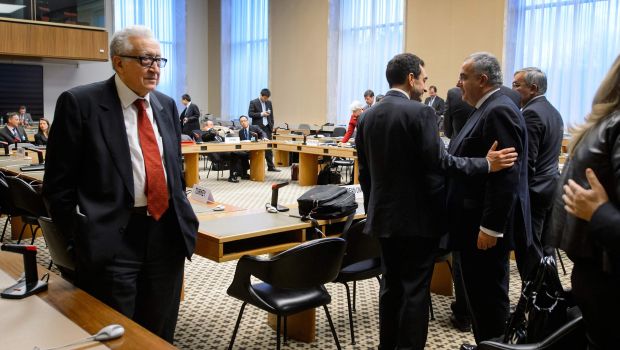
UN–Arab League envoy Lakhdar Brahimi (L) looks on before a meeting on Syria at the United Nations offices in Geneva on December 20, 2013. (REUTERS/Fabrice Coffrini/Pool)
Beirut, Asharq Al-Awsat—The Syrian National Coalition dismissed the chances of an international conference for the resolution of the Syrian crisis taking place on the sidelines of a preparatory meeting in Geneva for the January conference on Thursday night.
Abedlahad Staifo, a member of the Coalition’s delegation to the preparatory talks, told Asharq Al-Awsat: “The international climate does not indicate the possibility of holding a conference, especially as long as the issue of whether Assad stays or goes remains unresolved.”
Joint UN–Arab League envoy Lakhdar Brahimi opened a meeting on Friday to finalize the list of delegations that will participate in the conference. The meeting was set to decide which opposition delegations would attend January’s conference, with the Syrian Kurds insisting on sending an independent delegation. The participation of Saudi Arabia and Iran was also on the agenda.
The Coalition’s delegation to this week’s preliminary meetings, which included Secretary-General Badr Jamous, Abdelahad Staifo, Munzir Makhous and Nazir Al-Hakim, did not participate in the preparatory meeting.
It did hold holding bilateral meetings with other present delegations, however.
The Coalition delegation held meetings with the Russian Deputy Foreign Minister Mikhail Bogdanov, who did indicate any change in the Russian position. Russia is of the position that the Syrian opposition should attend the Geneva II without setting any preconditions.
While the opposition insists on the removal of Assad ahead of the talks, as a preliminary step to establishing a transitional government, the Assad regime and its allies, including Russia, insist they will not attend a conference where they will be expected to hand over power.
Staifo told Asharq Al-Awsat: “The Russians still insist on the opposition attending the conference with no conditions, which contradicts the Coalition’s desire, as we want guarantees of Assad’s departure.”
Commenting on Thursday’s Russian veto of a UN Security Council statement condemning the Assad regime’s human rights violations, Coalition Secretary-General Badr Jamous said the Coalition delegation, which he leads, had told the Russian delegation: “You [Russia] are responsible, alongside the regime, for killing us with Russian aircraft and missiles.”
Speaking about the planned Geneva conference, Jamous said: “The sponsoring states [of the Geneva II conference] want to leave the issues unclear and force the Syrians to reach agreement . . . The negotiations were based on solid understandings, such as the implementation of [the agreement reached at] Geneva I, and ensuring the commitment of all parties to all its articles.”
He added that “the important states are not serious about pressuring the Syrian regime, which continues in the killing, violence and destruction, and bombards civilians with explosive barrels in order to cause the failure of the Geneva conference.”
“The transitional government body will rule Syria, and nobody else will have a role after its formation: not a president, a prime minister, or a parliament,” Jamous insisted.
Coalition member Mohamed Sarmini told Asharq Al-Awsat that no decision has yet been made about whether or not the Coalition will participate in Geneva II, “but the general view within the Coalition is that most movements, including the Free Syrian Army but not the Islamic Front, agreed to participate within the principles of the Syrian revolution.”
Sarmini added that these principles included “the departure of Assad and the formation of a transitional body with full powers, agreed upon within the opposition . . . If Geneva II failed to produce these requirements, the opposition will be against participation.”
Some parties in the Coalition, including the revolutionary movement and the Syrian National Movement, have already expressed their intention to participate, while other parties, including the Damascus Declaration, have refused. The Syrian Muslim Brotherhood has not announced any decision regarding its participation so far.
In related news, meetings have been ongoing in Erbil since Tuesday between the Syrian Kurdish National Council, which is supported by the Kurdistan Regional Government of Iraq, and the People’s Council of West Kurdistan, which is considered to be the Syrian wing of the Turkish Kurdistan Workers’ Party (PKK) and is known for its links with the Syrian regime, in order to reach a united vision on the participation of the Kurds in the Geneva II conference.
The president of the Syrian National Coalition, Ahmed Al-Jarba, announced during a visit to a Syrian refugee camp in the Erbil governorate on Friday that “Syrian Kurds would participate in Geneva II with two delegations, the first with the opposition, and the second with the regime,” and that “the issue was final.”

Trackbacks/Pingbacks